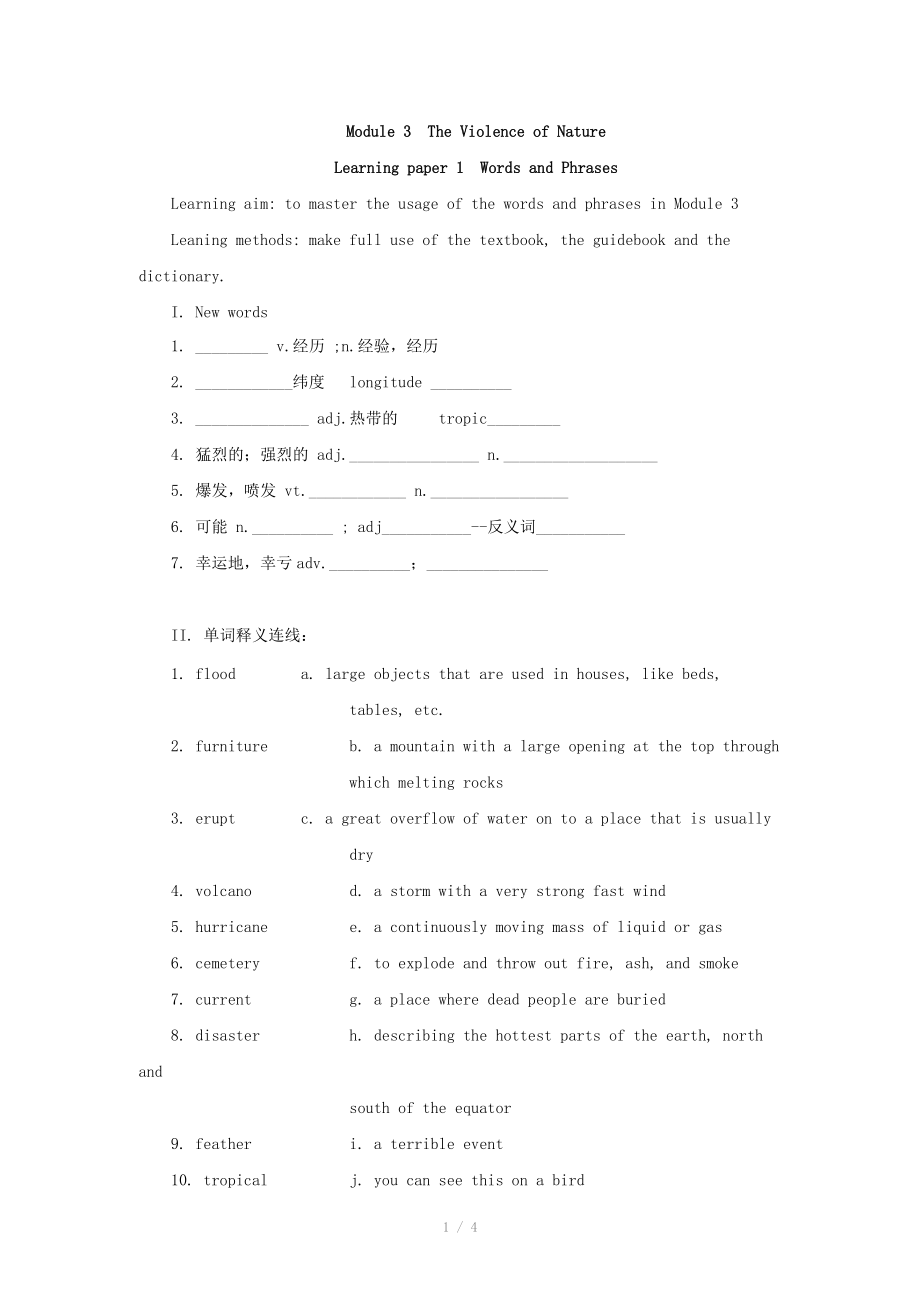《高一英語學(xué)案:Module 3 Learning paper 1 Words and Phrases(外研必修3)》由會員分享��,可在線閱讀���,更多相關(guān)《高一英語學(xué)案:Module 3 Learning paper 1 Words and Phrases(外研必修3)(4頁珍藏版)》請?jiān)谘b配圖網(wǎng)上搜索�����。
1����、
Module 3 The Violence of Nature
Learning paper 1 Words and Phrases
Learning aim: to master the usage of the words and phrases in Module 3
Leaning methods: make full use of the textbook, the guidebook and the dictionary.
I. New words
1. _________ v.經(jīng)歷 ;n.經(jīng)驗(yàn)��,經(jīng)歷
2. ____________緯度 longitude
2���、__________
3. ______________ adj.熱帶的 tropic_________
4. 猛烈的;強(qiáng)烈的 adj.________________ n.___________________
5. 爆發(fā)��,噴發(fā) vt.____________ n._________________
6. 可能 n.__________ ; adj___________--反義詞___________
7. 幸運(yùn)地�����,幸虧adv.__________����;_______________
II. 單詞釋義連線:
1. flood a. large objects
3�、that are used in houses, like beds,
tables, etc.
2. furniture b. a mountain with a large opening at the top through
which melting rocks
3. erupt c. a great overflow of water on to a place that is usually
dry
4. volcano d. a storm with a very strong fast wind
5. hurricane e. a c
4����、ontinuously moving mass of liquid or gas
6. cemetery f. to explode and throw out fire, ash, and smoke
7. current g. a place where dead people are buried
8. disaster h. describing the hottest parts of the earth, north and
south of the equator
9. feather i. a terrible event
5、10. tropical j. you can see this on a bird
III. 詞義辨析
2 / 4
1. occur; happen; take place
三者都有“發(fā)生”的含義����,但具體意義不同。
(1) occur為正式用語���,可指偶然發(fā)生�,也可指在制定的時間發(fā)生��、出現(xiàn)�,也可指抽象事物如思想等的發(fā)生。
(2) happen為常用語���,指事物或情況偶然或未能預(yù)見地發(fā)生��,其后接不定式或用在It happened that...句型中���,意為:恰好�,碰巧�����,偶然��。
(3) take place指“按計(jì)劃使某事或效果發(fā)生”����,一般沒有偶然的意味。
如:How
6�����、 did the accident happen? 事故是如何發(fā)生的��?
When will the wedding take place? 婚禮何時舉行�?
He told me how the accident occurred.他告訴我那事故是怎樣發(fā)生的����。
2. ruin; damage; destroy
三者都有“破壞,毀壞”之意����,但含義不同��。
ruin表示破壞嚴(yán)重��,以至不能修復(fù)��,強(qiáng)調(diào)致使該物的功能出現(xiàn)了問題��。
damage指部分“損壞����,破壞”之意���,或指價值�、用途降低或外表損壞等���,在破壞程度上damage要小于destroy�,損壞了還可修復(fù)����。
destroy指“通過某種有力的
7、或粗暴的手段使之徹底毀壞以至不能或很難修復(fù)”��,有時用于比喻意義,表示希望���、計(jì)劃等被打破�����。如:
She poured water all over my painting, and ruined it. 她把水全倒在了我的畫上�����,把畫毀了���。
Take care not to damage the timer mechanism. 當(dāng)心一點(diǎn),不要弄壞計(jì)時裝置���。
In order to escape the punishment, they have destroyed all the evidence. 為了逃避懲罰�����,他們毀掉了所有證據(jù)�。
IV. 根據(jù)漢語提示完成句子:
1. He___
8�、_____ (拾起) his suitcase and walked out.
2. The man________ (結(jié)果為……) in a cell for the night.
3. The house________ (著火) at about ten o’clock last night but it was soon________ (撲滅了).
4. She came in and________ (脫下) her coat.
5. When did the accident________ (發(fā)生) exactly?
6.There are_______________ six Atlantic hurricanes each year.(平均)7._______________, he failed the exam. (結(jié)果)
希望對大家有所幫助����,多謝您的瀏覽����!
 高一英語學(xué)案:Module 3 Learning paper 1 Words and Phrases(外研必修3)
高一英語學(xué)案:Module 3 Learning paper 1 Words and Phrases(外研必修3)

